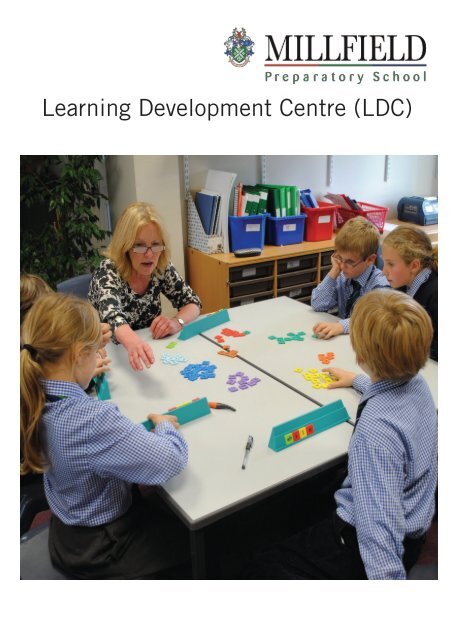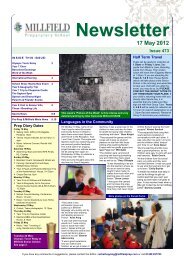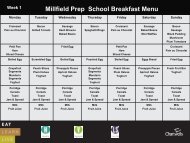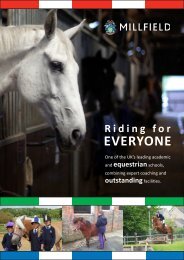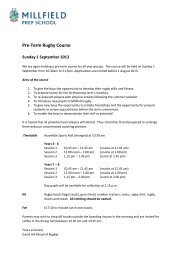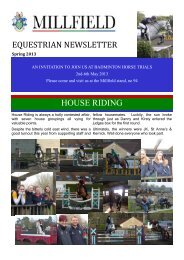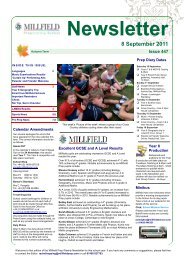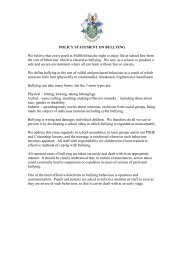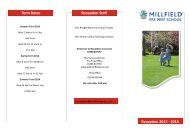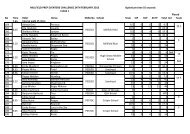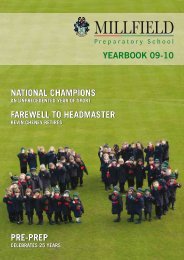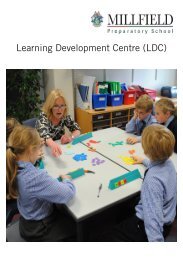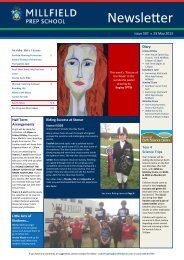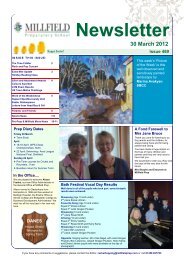Learning Development Centre (LDC) - Millfield Prep School
Learning Development Centre (LDC) - Millfield Prep School
Learning Development Centre (LDC) - Millfield Prep School
Create successful ePaper yourself
Turn your PDF publications into a flip-book with our unique Google optimized e-Paper software.
<strong>Learning</strong> <strong>Development</strong> <strong>Centre</strong> (<strong>LDC</strong>)
What provision is made for pupils with<br />
additional learning needs?<br />
The <strong>Learning</strong> <strong>Development</strong> <strong>Centre</strong><br />
The <strong>Learning</strong> <strong>Development</strong> <strong>Centre</strong><br />
(<strong>LDC</strong>) is currently staffed by seven<br />
dyslexia specialists who work mainly<br />
with children in small groups to<br />
develop literacy skills. In addition<br />
we have specialist teachers who can<br />
provide 1:1 support and we have<br />
access to a speech and language<br />
therapist. Both of these services are<br />
chargeable.<br />
The <strong>LDC</strong> is a specialist department<br />
within a mainstream school and<br />
is an integral part of the school,<br />
supporting staff in other curricular<br />
areas to ensure that best practice<br />
in respect of differentiation for<br />
additional learning is embedded<br />
in the school’s culture. We believe<br />
the <strong>LDC</strong> is unique in its quality and<br />
breadth of screening, assessment<br />
and intervention programmes.<br />
Tutors are not only dyslexia<br />
specialists, but they also have<br />
additional professional training and<br />
expertise to enable them to identify<br />
the underlying factors which are<br />
preventing successful learning from<br />
taking place.<br />
Additional areas of expertise and<br />
training include:<br />
• Screening for visual difficulties<br />
• Auditory processing assessments<br />
• Neuro-developmental delay<br />
assessment and intervention.<br />
Ethos<br />
Our ethos is that children, given<br />
the will to succeed, can achieve<br />
high standards. We recognise<br />
that learning may be hard, even<br />
unsettling at times; however, with<br />
the right approach and teamwork,<br />
success is attainable. A sense<br />
of urgency to promote literacy<br />
and learning is balanced by<br />
opportunities to enable children to<br />
restore a sense of balance in their<br />
lives. Through discussion and the<br />
development of reflective skills, they<br />
can begin to feel more in control of<br />
their learning and develop a positive<br />
perception of learning differences.
Every concerned parent knows<br />
only too well that childhood<br />
is too precious a time to have<br />
unproductive years at school. With<br />
a sixty year tradition of believing<br />
unequivocally in the value and<br />
potential of our children, we can<br />
instill them with the confidence to<br />
dream big dreams and know they<br />
are attainable.<br />
Initial Interview<br />
If there are indications or concerns<br />
that a child may have additional<br />
learning needs, a <strong>LDC</strong> tutor will be<br />
involved in the interview process.<br />
When meeting with the parents and<br />
child, the tutor will explain how the<br />
<strong>LDC</strong> operates and how this differs<br />
from many other independent<br />
schools. It is important at this<br />
point to clarify that <strong>Millfield</strong> is not<br />
selective on entry and can cater for<br />
a range of abilities. It is not however<br />
a suitable or appropriate placement<br />
for pupils needing significant<br />
support within their classroom or<br />
with other aspects of the school’s<br />
programmes.<br />
At <strong>Millfield</strong> <strong>Prep</strong>aratory <strong>School</strong>,<br />
time for additional learning support<br />
is built into the curriculum. This<br />
means that pupils who need fulltime<br />
support (typically 4-5 sessions<br />
of 40 minute lessons), do not miss<br />
other lessons when they are working<br />
in the <strong>LDC</strong>. These pupils will also<br />
often have an <strong>LDC</strong> tutor as their<br />
group tutor and as their English<br />
teacher.<br />
The interview process includes<br />
a number of assessments which<br />
are tailored to the individual child<br />
and the reports available. Parents<br />
are consulted on any underlying<br />
difficulties such as vision, auditory<br />
processing, attitude to learning<br />
and other relevant factors. If<br />
appropriate, a detailed neurodevelopmental<br />
delay assessment of<br />
the child by the Director of the <strong>LDC</strong><br />
may be discussed with the parents.<br />
This can establish whether there are<br />
any underlying immaturities in the<br />
child’s development which may be<br />
preventing the child from making<br />
the best of their abilities.<br />
Signs of neuro-developmental delay<br />
can include:<br />
• Frustration<br />
• Underperformance<br />
• Academic difficulties<br />
• Difficulties with fine and gross<br />
motor skills<br />
• Balance and coordination<br />
difficulties<br />
• Early childhood traumas
The child may be finding it difficult<br />
to perform daily tasks to their<br />
true level of potential, while to<br />
all outward appearances there is<br />
no sign of this. Currently a group<br />
based developmental movement<br />
programme operates before the<br />
school day starts as part of this<br />
approach.<br />
When a pupil is accepted into<br />
the school, their <strong>LDC</strong> tutor will<br />
summarise information about<br />
them which is then made available<br />
electronically to all members of<br />
staff. This provides guidance to<br />
what the teacher / adult might<br />
observe and recommendations for<br />
specific strategies and support.<br />
Curriculum<br />
The <strong>LDC</strong> is well-resourced<br />
to implement multi-sensory<br />
programmes which train and<br />
develop areas such as visual and<br />
auditory perception, discrimination<br />
and processing as well as memory,<br />
thinking and reasoning skills.<br />
Reading, writing and spelling<br />
are taught with the benefit of<br />
software as well as more traditional<br />
resources. As children become more<br />
skilled, they pursue programmes to<br />
develop tactics in comprehension,<br />
grammar and vocabulary.<br />
Dependent on age and maturity,<br />
children are expected to engage<br />
actively in monitoring their progress<br />
and in setting themselves realistic<br />
targets in partnership with their<br />
tutor. The development of self<br />
awareness and reflective strategies
is an essential part of this approach.<br />
Activities such as planning how<br />
to approach a given learning task,<br />
monitoring comprehension, and<br />
evaluating progress toward the<br />
completion of a task form part<br />
of the pupil’s programme, where<br />
necessary.<br />
In Conclusion<br />
Recognising the consequence<br />
of failure which may have been<br />
experienced in varying degrees<br />
by those who attend the <strong>LDC</strong>, the<br />
school accepts children based on<br />
their potential for growth rather than<br />
their current performance.<br />
We aim to make a sizeable<br />
contribution to the lives of those<br />
children striving to overcome<br />
learning differences and it is a<br />
combination of rigor and empathy<br />
which drives the <strong>LDC</strong>. Children<br />
know that they are secure and<br />
their difficulties are understood;<br />
they also know that there are high<br />
expectations of them.<br />
We recognise that children who<br />
attend the <strong>LDC</strong> contribute a great<br />
deal in many ways to the diversity<br />
of our school community and we are<br />
proud when we are able to see them<br />
flourish.
For further information please contact:<br />
Director of the <strong>LDC</strong>: Mrs Mary Mountstephen MA (SEN)<br />
Associate Member of The British Dyslexia Association<br />
mem@millfieldprep.com<br />
Glastonbury, Somerset BA6 8LD UK<br />
Tel: +44 (0)1458 832446<br />
Email: office@millfieldprep.com<br />
www.millfieldprep.com


